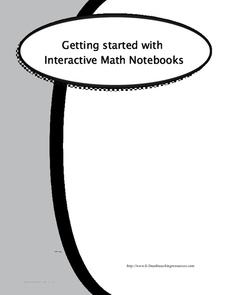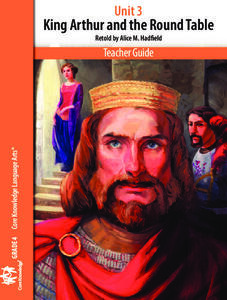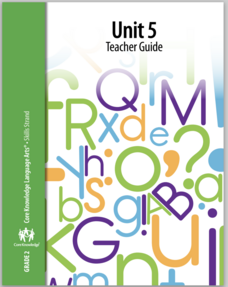EngageNY
Summarizing Bivariate Categorical Data in a Two-Way Table
Be sure to look both ways when making a two-way table. In the lesson, scholars learn to create two-way tables to display bivariate data. They calculate relative frequencies to answer questions of interest in the 14th part of the series.
LABScI
Atomic Structure and the Periodic Table of Elements: The Secret Agent Lab
Food always gets attention! Model atomic structure using fruit loops to represent the subatomic particles. After building models, scholars create ionic bonds using their models. Finally, they use these concepts to create a periodic table.
Curated OER
Getting Started with Interactive Math Notebooks
Set young mathematicians up for success with this interactive math notebook. Including a list of rules and expectations for using the notebooks, as well as templates for a creating a cover page and table of contents, this resource...
Core Knowledge Foundation
Unit 3: King Arthur and the Round Table
Over four weeks, fourth graders study King Arthur and the Round Table, retold by Alice M. Hadfield. Fifteen lessons take pupils through each chapter, complete word work, and the writing process to draft paragraphs, sentences, dialogue,...
Mathematics Vision Project
Module 9: Modeling Data
How many different ways can you model data? Scholars learn several in the final module in a series of nine. Learners model data with dot plots, box plots, histograms, and scatter plots. They also analyze the data based on the data...
Mathematics Vision Project
Module 8: Probability
It's probably a good idea to use the unit. Young mathematicians learn about conditional probability using Venn diagrams, tree diagrams, and two-way tables. They also take into consideration independence and the addition rules.
Mathematics Vision Project
Module 6: Congruence, Construction, and Proof
Trace the links between a variety of math concepts in this far-reaching unit. Ideas that seem very different on the outset (like the distance formula and rigid transformations) come together in very natural and logical ways. This unit...
Mathematics Vision Project
Module 9: Statistics
All disciplines use data! A seven-lesson unit teaches learners the basics of analyzing all types of data. The unit begins with a study of the shape of data displays and the analysis of a normal distribution. Later lessons discuss the...
Teach Engineering
Discovering Relationships Between Side Length and Area
Consider the relationship between side length and area as an input-output function. Scholars create input-output tables for the area of squares to determine an equation in the first installment of a three-part unit. Ditto for the area of...
New York City Department of Education
Egypt
This six-week unit encompasses all subjects with a focus study on world history and the development of ancient civilizations. As gifted and talented students dive into the interesting yet challenging topic of Egypt, they think critically...
Core Knowledge Foundation
Maya, Aztec, and Inca Civilizations
A 10-lesson unit explores the Maya, Aztec, and Inca civilizations. Over the course of two weeks, scholars read nonfiction excerpts, discuss their findings, and complete activities. An assessment equipped with multiple choice and matching...
Core Knowledge Foundation
Kindergarten Skills Unit 5
A unit designed for kindergarteners builds letter-sound correspondence in preparation for reading. Over four weeks, young scholars build proficiency in recognizing and matching the sound of 9 letters. They take that knowledge to read a...
Core Knowledge Foundation
Kindergarten Skills Unit 6
Throughout 15 lessons, scholars explore four and five-sound and rhyming words, closely examining initial and final consonant sounds, and begin reading the text independently. Each lesson follows a similar routine; an introduction to...
Core Knowledge Foundation
Kindergarten Skills Unit 7
A unit consists of seventeen lessons that examine six new consonant digraphs. Lessons review past concepts, introduce sounds and spelling, and offer differentiated instruction in small groups. Learners begin reading a decodable story and...
Core Knowledge Foundation
Kindergarten Skills Unit 9
This unit explores uppercase letters and tricky high-frequency words. Over 23 lessons, scholars review decodable and high-frequency words, examine and practice writing uppercase letters, and work with a new tricky high-frequency word....
Core Knowledge Foundation
First Grade Skills Unit 4
Twenty-eight lessons make a unit that focuses on skills practice. Lessons explore r-controlled vowels, past tense verbs, nouns, adjectives, and two-syllable words. Pupils read a story, answer questions, and draft a descriptive essay...
Core Knowledge Foundation
First Grade Skills Unit 5
Twenty-two lessons make up a unit that focuses on first-grade skills. Scholars examine spelling alternatives—their rules and patterns, practice tricky spelling and high-frequency words, explore plural nouns and sentences, read a...
Core Knowledge Foundation
First Grade Skills Unit 7
The last unit in the series by Core Knowledge focuses on alternative spellings, nouns, verbs, conjunctions, subject-verb agreement, using commas in a series, constructing sentences, and following the writing process while writing...
Core Knowledge Foundation
Different Lands, Similar Stories Tell It Again!™ Read-Aloud Anthology
A read-aloud anthology highlights how one story differs depending on where it comes from. Scholars listen carefully to familiar and new stories, participate in discussions, and complete word work practice. Extensions for each lesson...
Core Knowledge Foundation
Animals and Habitats Tell It Again!™ Read-Aloud Anthology
A read-aloud anthology explores various habitats and the animals that inhabit them, from the Artic to the desert, the forest, and bodies of water. First graders listen to and discuss texts and complete word work. Each lesson offers...
Core Knowledge Foundation
Frontier Explorers Tell It Again!™ Read-Aloud Anthology
The last read-aloud anthology in the series showcases frontier explorers. First graders listen to texts about Daniel Boone, crossing the Appalacian Mountains, Lewis and Clark, dangers on the prairie, and more. After reading, pupils...
Core Knowledge Foundation
Greek Myths Tell It Again!™ Read-Aloud Anthology
A unity covers Greek mythology through read-alouds and activities. Fourteen lessons share a new story that pupils discuss, then complete word work and extension opportunities. Topics include the gods of Mount Olympus, Hercules, and more.
Core Knowledge Foundation
Second Grade Skills Unit 5: Sir Gus
A unit focuses on second-grade skills, specifically spelling, grammar, writing, and reading. Over six weeks, scholars review spelling patterns and tricky words, and explore verb tenses, adjectives, subjects, and predicates. They write...
Core Knowledge Foundation
Third Grade Skills Unit 4: Stories of Ancient Rome
A unit covering stories of Ancient Rome examines spelling rules, suffixes, verbs, quotation marks, writing, and dictionary skills. Lessons follow a similar routine; reading, skills practice, and extension activities, followed by...
Other popular searches
- Using Table of Contents
- Table of Contents Index
- Table of Contents Sheets
- Table of Contents Worksheets
- Using a Table of Contents
- Table of Contents and Index
- Table of Contents Learning
- Table of Contents Lessons
- Using the Table of Contents
- Table of Contents, Headings

























